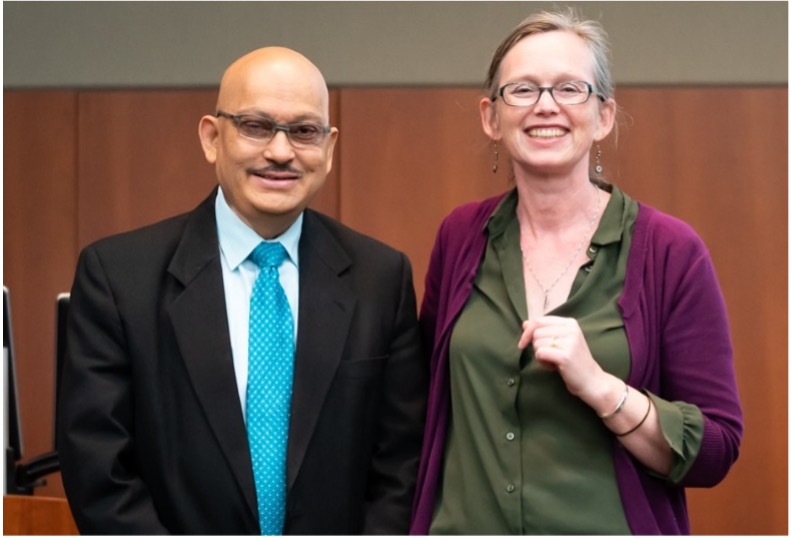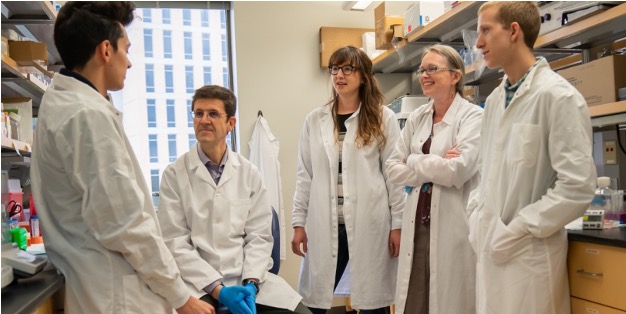“Age,” as the saying goes, “is an issue of mind over matter–if you don’t mind, it doesn’t matter.” But it comes with its share of hurdles, many of them related to health of the body and mind. It is the understanding and mitigation of these issues that has driven the philosophy and work of the University of Wisconsin-Madison’s Biology of Aging and Age-Related Diseases T32 Training Program. Funded by the National Institute on Aging since 1991, the goal of the program is to train the next generation of aging researchers to advance the understanding of aging biology and why aging poses the greatest risk for a host of common but debilitating diseases. With roughly 22 percent of the U.S. population turning 65 years or older by 2050, research on aging is critical. To date, the program has acted as a launching pad for over 100 pre- and post-doctoral scholars.
How is the Biology of Aging Training Program preparing the next generation of researchers? According to Biology of Aging associate director Rozalyn Anderson, “The overarching goal of this NIH/NIA T32 training grant is to nurture the careers of future Biology of Aging research leaders. Dr. Asthana and I are committed to provide the best possible training environment in terms of research, scientific and intellectual growth, and career development.”
Leadership

Developing an environment where aging scholarship can flourish requires many skills. Fortunately, Director Sanjay Asthana, MD, and Associate Director Rozalyn Anderson, PhD, lead the program with complimentary expertise and experience.
Dr. Asthana is the head of Geriatrics and Gerontology and Director of the Geriatric Research Education and Clinical Center at the Middleton VA Hospital. He is also the founding director of the Wisconsin Alzheimer’s Disease Research Center and an internationally renowned researcher and leader in the study of Alzheimer’s disease.
Dr. Anderson began investigating the biology of aging in 2000 as a post-doctoral fellow at Harvard Medical School. She later joined the University of Wisconsin, first as a Biology of Aging scholar, and then as an assistant scientist at the Wisconsin National Primate Research Center. Currently, Dr. Anderson is a tenured Associate Professor of Medicine and Director of the Metabolism of Aging program at the School of Medicine and Public Health. Dr. Anderson is President of the American Aging Association and Chair-elect of the Biological Sciences section of the Gerontological Society of America.
Scholars
Scholars who apply to the program are selected based on their credentials, commitment to biomedical research, and thematic alignment of their proposed work. Biology of Aging scholars are highly motivated and engage in program activities from research to communication to career development. The scholars have an annual stipend that enables them to attend scientific meetings and workshops. The research portfolio of the program features a variety of disciplines including projects focused on aging-related inflammation, cancer, neurodegeneration, sarcopenia, and nutrition in healthy aging. Scholars graduating from the program often point to its focus on research and professional development as indispensable to their later work.
Mentors

Scholars work with distinguished faculty mentors from a variety of campus departments, including Biochemistry, Cell & Regenerative Biology, Comparative Biosciences, Mechanical Engineering, Genetics, Geriatrics, Medicine, Nutritional Sciences, Pharmacology, and more. Each new scholar works with a mentor affiliated with the program but has opportunities to interact and network with the other faculty on the grant through the seminar series and the Biology of Aging course offered through the program. Scholars have ample opportunities to network and collaborate with peers and faculty engaged in aging research across campus.
Opportunities
Scholars are given many opportunities through the training program to learn and advance their biology of aging knowledge and skills; didactic training in Basic and Translational Aging Biology, mentored training and professional skill development, the Biology of Aging Seminar Series, are all part of the program.
The Cellular and Molecular Biology of Aging (Path751) course is one such opportunity. Scholars are able to work directly with experts to cover modules focused on basic biology and clinical aspects of age-related diseases such as stroke, heart and vascular disease, diabetes, cancer, asthma and COPD, and sarcopenia. Interspersed among these modules are presentations that shine a spotlight on emerging technologies in aging research (e.g., epigenetics, stem cells, and genome-wide association study). Students enjoy the broad range of topics covered and how both the biology of different areas of aging and the clinical implications are included.
Scholars gain experience in presenting their research to others within the university and at other universities through the Biology of Aging T32 Seminar Series, Madison Scholars Symposium, and the Visiting Scholars Program. The Madison Scholars Symposium launched in 2018 includes multiple T32 programs on campus. This forum provides experience in giving short oral presentations and conference talks to a large interdisciplinary audience.

The Visiting Scholars Program is a national initiative among aging focused T32 programs that provides opportunities for postdoctoral scholars to meet peers at other institution’s (University of Washington, University of Minnesota), present their work formally, and to engage with faculty in aging research.
Scholars in the World
Alumni of the Biology of Aging program can be found across the country conducting research in industry settings, academia, and at the NIH. The pre-doctoral scholars go on to get their doctorates and more often than not opt to complete additional training. The doctoral scholars most often move directly into scientist or faculty positions and go on to lead their own independent research programs. Quite a few scholars have chosen to stay at the University, but others take their expertise to other universities like the University of Connecticut, Iowa State University, and University of Washington.
Not a Foregone Conclusion
Aging may be a natural phenomenon but it will require more than a clever adage to deal with its effect on an individual’s body and mind. The field of aging research is changing fast, and nimble, creative researchers supported by this program, through their research, will allow us to go beyond traditional views of getting old. Advancing what we know about aging biology will help us to define how age creates vulnerability for disease, and how to translate those insights to design preventative interventions for clinical application. With the guidance of Drs. Asthana and Anderson, the scholars of this program contribute to aging research’s overarching goal: to ensure that aging is not a time of decline but of continued health and well-being.
For more information about the Biology of Aging and Age-Related Diseases Training Program and its current projects visit https://biologyofaging.wisc.edu